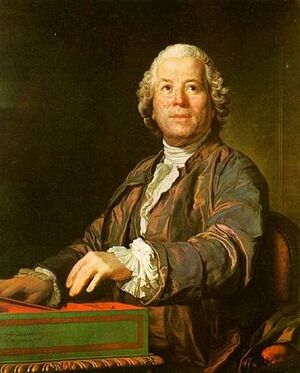Christoph Willibald Gluck
German composer (b. 2 July 1714 [N.S.] in Erasbach, Bavaria; d. 15 November 1787 [N.S.] in Vienna).
Tchaikovsky and Gluck
Tchaikovsky did not say that much about Gluck in his writings, and this may to some extent be because of what Herman Laroche described as his friend's indifference to all music before Beethoven, with the exception of Mozart and a few works by Haydn. Nevertheless, Tchaikovsky certainly knew very well the first of Gluck's 'reform operas' — Orfeo ed Euridice, which was often performed by the students of both Conservatories, and in the spring of 1872 he saw the makings of a great actress and singer in the young Yevlaliya Kadmina when she appeared as Orpheus at a student production of the opera in Moscow.
In an article written later in 1872, discussing Wagner's "symphonic" operas in which the singers were in effect subsidiary to the orchestra, Tchaikovsky observed that Wagner's approach was not really the same as that "austere renunciation of the beauties of graceful melodiousness for the sake of authentic declamation" which Gluck in particular had aspired to (see TH 270). From this remark, it is clear that Tchaikovsky was familiar with the famous preface to Alceste (1767) in which Gluck had set forth the principles of the operatic reform he was striving for — in particular, to write music of "a beautiful simplicity" (eine schöne Einfachheit). Tchaikovsky was very likely exaggerating when he spoke of the "austerity" of Gluck, and he must clearly have been moved by the tragic expressiveness and nobility of the music in Orfeo or the overtures to Alceste and Iphigénie en Aulide, as otherwise he would not have written in his diary in 1886 that he found Gluck's music "attractive" (see below).
During his memorable meeting with Pauline Viardot in Paris in June 1886 it is very likely that, apart from discussing their shared love of Mozart's Don Giovanni, Tchaikovsky would also have asked her about her memorable performances as Orpheus (in the version which Berlioz had specially made for her in 1859). This was one of her signature roles, and the great Russian writer Ivan Turgenev was one of many who had been moved to tears by her ability to convey Orpheus's grief for his beloved Eurydice.
Arrangements by Tchaikovsky
- O, del mio dolce ardor, TH 178 (1870) — Tchaikovsky's arrangement for voice and orchestra of Paride's aria from Act I of Gluck's opera Paride ed Elena (1770); at the time the original aria was wrongly attributed to Alessandro Stradella.
General Reflections on Gluck
In Tchaikovsky's Music Review Articles
- TH 284 — While discussing Mozart's Don Giovanni, Tchaikovsky remarks that those listeners who were fond of Gluck's accompanied recitatives would get more than their money's worth from the much more powerfully expressive recitatives of Donna Anna.
In Tchaikovsky's Diaries
- Diary entry for 20 September/2 October 1886, in which Tchaikovsky reflects mainly on his contrasting feelings for Mozart and Beethoven, but discusses briefly Mozart's predecessors at the end:
"… Gluck, despite the relative poverty of his creative faculty, I find attractive. I like a thing or two in Haydn's music. However, all these four big shots [i.e. Bach, Handel, Gluck, and Haydn] are amalgamated in Mozart. He that knows Mozart knows everything that was good about these four, since, being the greatest and most powerful of musical Creators, he did not disdain to take them under his wing, thereby saving them from oblivion. They are like rays which are submerged in the sun that Mozart is" [1].
Views on Specific Works by Gluck
In Tchaikovsky's Music Review Articles
- Orfeo ed Euridice, opera (1762, revised 1774) — TH 270 (Tchaikovsky recalls Yevlaliya Kadmina's interpretation of Orpheus at student performances of Gluck's masterpiece at the Moscow Conservatory in the spring of 1872).
Bibliography
External Links
Notes and References
- ↑ Quoted here from Дни и годы П. И. Чайковского. Летопись жизни и творчества (1940), p. 386.

